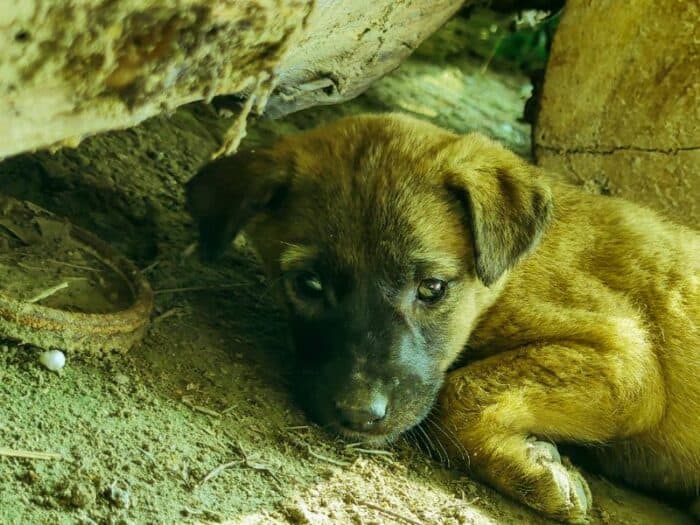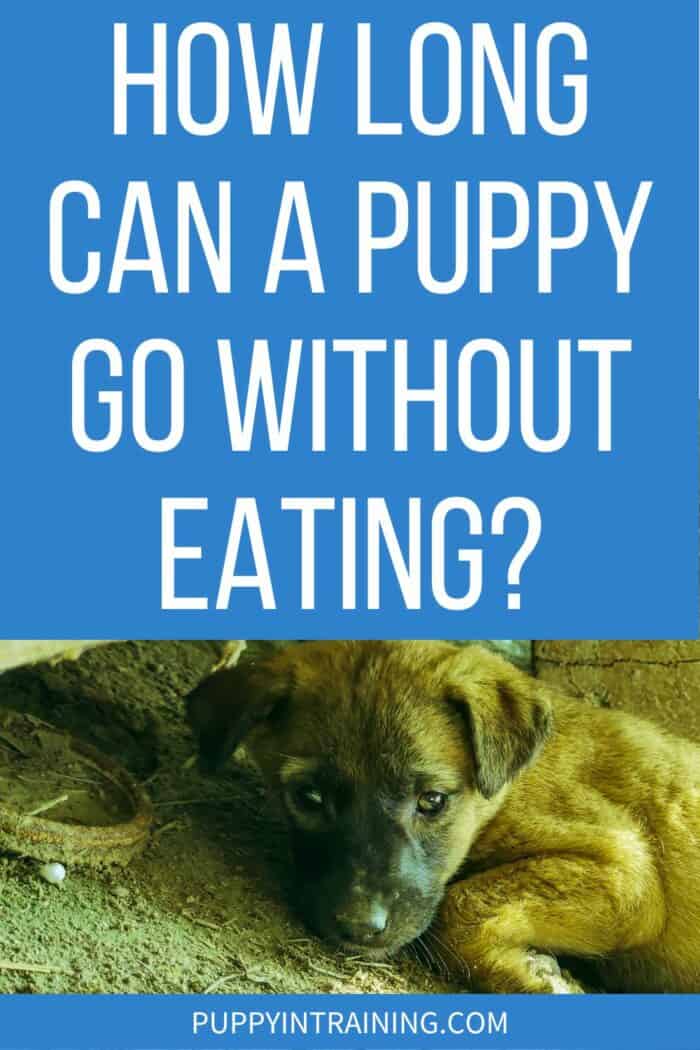How Long Can a Puppy Go Without Eating?
This post may contain affiliate links. We may earn money or products from the companies mentioned in this post.
If you have recently noticed that your puppy has stopped eating their food, you may be worried, and with good reason!
There are a select few essential needs that your puppy requires to survive. This includes food, water, shelter, and affection.
When one of these elements is missing, it can lead to serious health complications.
But how long can a puppy go without eating?
At what point should you seek veterinary attention?
The answer isn’t that cut and dry. The length of time your puppy can survive without food will depend on several factors, including age, breed, overall size, health, and lifestyle.
A healthy puppy can survive longer without food than a newborn puppy. Some breeds are at a higher risk of complications such as low blood sugar.
We have put together this guide to help you identify a serious problem and know when to contact your veterinarian.
Let’s take a deep dive into the question, “How long can a puppy go without eating” and what you can do to resolve the situation.

How Long Can a Puppy Go Without Food?
If you recently brought a new puppy home, then you know this can be a high-stress time.
Puppies are at high risk for so many illnesses and diseases that dog owners are concerned about even the smallest signs of trouble.
Refusing to eat, of course, is a big sign to recognize. This could signify minor gastrointestinal discomfort, high stress, and anxiety, or a more serious health concern.
But how long can a puppy go without eating? At what point should you be calling your veterinarian for assistance?
As young puppies, many elements of their lives are changing, which could trigger stress or anxiety.
Your puppy has left the only home they have known to date.
They are living in a new home with new surroundings, new sounds, new people or animals, new smells, and potentially a new diet (or dietary schedule).
That’s a lot for a young pup to adjust to!
Don’t stress out if your puppy has just started turning their nose up at their food. The length of time your puppy can survive without eating depends on age.
The average, healthy 8-week-old puppy can handle not eating for 8 hours before you need to step in.
Try enticing your puppy with food that offers a tempting smell. Dogs have much fewer tastebuds than humans, meaning their joy with food isn’t tied to the taste.
But their strong sense of smell plays an integral part in deciding that a meal is enticing.
If you have taken steps to make your puppy’s meal more compelling and they are still uninterested after two days, you should contact your veterinarian.
They can run tests to identify the problem.
How Long Can a Newborn Puppy Go Without Eating?
The situation is much more serious when a newborn puppy is not eating. At this young age, newborn puppies are incredibly fragile.
Puppies under two weeks old need to be fed every 3-4 hours. Slightly older puppies, aged two to four weeks, should be fed every 6-8 hours.
If your puppy fails to keep up with this feeding schedule, that is a sign that something is wrong.
Puppies can quickly go from healthy to on death’s door at this young age.
A puppy that isn’t getting the nutrition necessary to support their needs will require veterinary support as soon as possible.
When we were raising newborn Golden Retriever puppies we kept a newborn puppy weight chart to track and make sure they were gaining weight every day.
If one of our puppies didn’t gain weight one day it was a cause for major concern as it often meant that something was wrong.
Luckily we only had to make one trip to the vet with our newborn puppiess but we had several other stressful moments when raising newborn pups.
How Long Can a Puppy Go Without Water?
While an 8-week-old puppy can survive for two days without food before a veterinarian is needed, the same can’t be said for water.
Puppies are at high risk for dehydration, and any time spent without water should be taken seriously.
Many trainers recommend taking away your puppy’s water approximately 2-3 hours before bedtime.
PRO TIP: The guide dog school we work with does not recommend ever taking water away from your puppy even before bedtime. Why? Because they noticed that puppies that were deprived of water tended to “load up” by drinking a lot when they had the chance. This leads to more potty accidents.
These can go up to 12 hours safely without water before you should be concerned.
After being weaned, a puppy should drink approximately 1/2 – 1 ounce of water for each pound of body weight.
If your puppy falls short of this, your veterinarian may recommend ways to increase your puppy’s water intake.
What to Do When a Puppy Won’t Eat?
If you have noticed that your puppy isn’t eating, there are steps that you can take to help encourage them to dig in. This includes:
- Adding hot water to kibble: Hot water helps to release the smells of your puppy’s kibble while creating a tasty gravy. Be sure to allow your puppy’s meal to cool enough to eat safely.
PRO TIP: The guide dog school now recommends adding water to kibble at all meals even for our older puppies. - Mix in canned food: If you feed kibble exclusively and have a puppy not eating, try adding some flavor with a bit of canned food. If you’re concerned about your puppy’s calorie intake, adjust the amount of kibble to compensate for the added calories of the canned food.
- Add a little sodium-free broth: A tasty alternative to hot water, a little broth can help to create an enticing smell while also adding flavor to your puppy’s meal.
- Introduce a food puzzle toy: Puzzle toys and interactive feeders are toys that encourage your puppy to work to earn their meal. This may sound counterproductive if your puppy hasn’t been eating, but the challenge of working through a toy can help to solve boredom and make mealtime fun again.
- Exercise before mealtime: Help to stimulate your puppy’s appetite with a bit of physical activity. This could come in the form of a short walk (if they are up to date on their vaccinations), a game of fetch, a training session, or any other form of mental or physical stimulation before meals.
Final Thoughts
Don’t hesitate to contact your veterinarian if your puppy refuses to eat their food.
While it’s normal for a dog to lose their appetite occasionally, it could be a sign of a serious underlying health concern like parvo.
If your puppy is sick, the sooner they receive medical care, the better their chances of survival.
In the meantime, adding something to their meal with an enticing scent or taste could help to encourage your puppy to eat.
This could include a bit of canned puppy food, a little brother, or creating gravy with hot water.
Save To Pinterest

Top Picks For Our Puppies
- BEST DOG CHEW
We Like: Beef Collagen Sticks - All of our pups love to bite, nip, and chew. We love using Collagen Sticks to help divert these unwanted behaviors. - BEST PUPPY TOY
We Like: Calmeroos Puppy Toy w/ Heartbeat and Heat Packs - Perfect for new puppies. Helps ease anxiety in their new home. - BEST DOG TREATS
We Like: Crazy Dog Train-Me Treats - We use these as our high-value treats for our guide dog puppies. - BEST FRESH DOG FOOD
We Like: The Farmer's Dog - A couple months ago we started feeding Raven fresh dog food and she loves it! Get 50% off your first order of The Farmer's Dog.
Check out more of our favorites on our New Puppy Checklist.